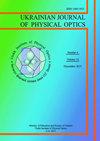Centrifugation-based separation of triangular silver nanoplates from multi-shaped colloidal silver nanoparticles for fabrication of surface-enhanced Raman-scattering substrates
IF 8.6
4区 物理与天体物理
0 OPTICS
引用次数: 0
Abstract
. We synthesize and separate triangular silver nanoplates (TSNPs) from a mixture of colloidal silver nanoparticles of different shapes and sizes, aiming at fabrication of substrates for a surface-enhanced Raman scattering (SERS). The TSNPs are successfully synthesized via a photochemical process involving Ag nanoseeds. This is confirmed by the UV-visible spectroscopy and transmission electron-microscopy analyses. Centrifugation-based separation techniques are employed to isolate the TSNPs and minimize the other nanoparticle morphologies, thus resulting in a good SERS performance. The separated TSNPs manifest a remarkable sensitivity, with the detection limit amounting to 10 –12 M in the case of Rhodamine 6G molecules. A linear relationship between the Rhodamine 6G concentration and the Raman-peak intensity demonstrates a great potential of our SERS technique. Hence, our study combines a successful synthesis and separation of the TSNPs with demonstration of their efficient SERS performance. The latter offers new possibilities for the ultrasensitive trace-level detection of substances. These findings contribute to the development of reliable SERS measurements and the advance in the field of nanomaterial-based sensing techniques.基于离心分离的三角形银纳米板和多形胶体银纳米颗粒制备表面增强拉曼散射基底
。我们从不同形状和大小的胶体银纳米粒子的混合物中合成并分离三角形银纳米板(tsps),旨在制造表面增强拉曼散射(SERS)的衬底。利用银纳米种子的光化学方法成功合成了tsps。紫外可见光谱和透射电镜分析证实了这一点。采用离心分离技术分离tsps,最大限度地减少其他纳米颗粒形态,从而获得良好的SERS性能。所分离的tsps具有显著的灵敏度,在罗丹明6G分子的情况下,检测限为10 -12 M。罗丹明6G浓度与拉曼峰强度之间的线性关系显示了SERS技术的巨大潜力。因此,我们的研究结合了tsps的成功合成和分离,并展示了它们高效的SERS性能。后者为超灵敏的痕量物质检测提供了新的可能性。这些发现有助于可靠的SERS测量的发展和基于纳米材料的传感技术领域的进步。
本文章由计算机程序翻译,如有差异,请以英文原文为准。
求助全文
约1分钟内获得全文
求助全文
来源期刊
CiteScore
9.90
自引率
0.00%
发文量
20
审稿时长
>12 weeks
期刊介绍:
“Ukrainian Journal of Physical Optics” contains original and review articles in the fields of crystal optics, piezo-, electro-, magneto- and acoustooptics, optical properties of solids and liquids in the course of phase transitions, nonlinear optics, holography, singular optics, laser physics, spectroscopy, biooptics, physical principles of operation of optoelectronic devices and systems, which need rapid publication.
The journal was founded in 2000 by the Institute of Physical Optics of the Ministry of Education and Science of Ukraine.

 求助内容:
求助内容: 应助结果提醒方式:
应助结果提醒方式:


